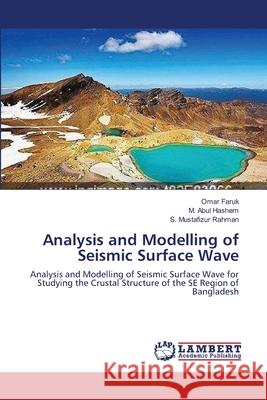Analysis and Modelling of Seismic Surface Wave » książka
Analysis and Modelling of Seismic Surface Wave
ISBN-13: 9783659153815 / Angielski / Miękka / 2012 / 192 str.
In this work crustal structure of the south-eastern region of Bangladesh is estimated by using seismic surface wave data. In order to make a relationship between earthquake wave and crustal structure of an area, time frequency to amplitude analysis which is an extension of time frequency analysis is brought for the analysis of synthetic and real data. Analyses have well marked the sequences over the recorded earthquake wave however it lacks to make a meaningful relation with crustal parameters though it is revealed that the technique can be further used for characterization of the geology of the earth. The research work is then extended to dispersion analysis of the earthquake wave. Group velocity dispersions are computed using graphical method and modified Haskell matrix method for both the earthquake data and the model parametric data. Sensitivity and the statistical errors of the model have also been studied. Interpreted results have shown that the crustal structure of the south-eastern region of Bangladesh is consisted of four major subsurface layers of thickness 1.5 km, 5.0 km, 6.0 km and 8.0 km to a total depth of 20.5 km.
In this work crustal structure of the south-eastern region of Bangladesh is estimated by using seismic surface wave data. In order to make a relationship between earthquake wave and crustal structure of an area, time frequency to amplitude analysis which is an extension of time frequency analysis is brought for the analysis of synthetic and real data. Analyses have well marked the sequences over the recorded earthquake wave however it lacks to make a meaningful relation with crustal parameters though it is revealed that the technique can be further used for characterization of the geology of the earth. The research work is then extended to dispersion analysis of the earthquake wave. Group velocity dispersions are computed using graphical method and modified Haskell matrix method for both the earthquake data and the model parametric data. Sensitivity and the statistical errors of the model have also been studied. Interpreted results have shown that the crustal structure of the south-eastern region of Bangladesh is consisted of four major subsurface layers of thickness 1.5 km, 5.0 km, 6.0 km and 8.0 km to a total depth of 20.5 km.











